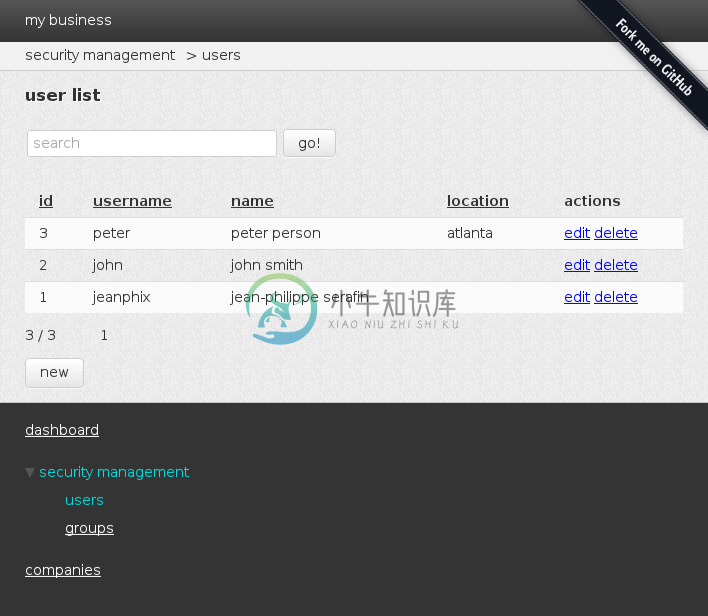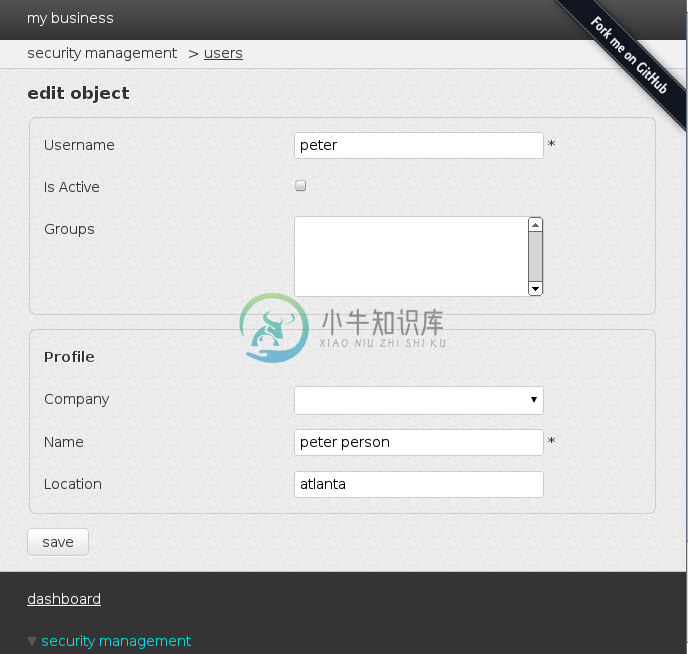Flask Dashed 中文文档
介绍
Flask-Dashed 提供构建简单以及具有扩展性的管理界面的工具。
在线演示: http://flask-dashed.jeanphi.fr/ (需要 Github 账号)。
列表视图:

表单视图:

安装
pip install Flask-Dashed
最小的使用
代码:
from flask import Flask
from flask_dashed.admin import Admin
app = Flask(__name__)
admin = Admin(app)
if __name__ == '__main__':
app.run()
示例应用程序: http://github.com/jeanphix/flask-dashed-demo
安全地处理
保护(“武装”)所有模块端:
from flask import session
book_module = admin.register_module(BookModule, '/books', 'books',
'book management')
@book_module.secure(http_code=401)
def login_required():
return "user" in session
保护(“武装”)特定的模块端:
@book_module.secure_endpoint('edit', http_code=403)
def check_edit_credential(view):
# I'm now signed in, may I modify the ressource?
return session.user.can_edit_book(view.object)
模块组织
由于管理节点( node )注册到一个“树”,因此很容易地管理它们。:
library = admin.register_node('/library', 'library', my library)
book_module = admin.register_module(BookModule, '/books', 'books',
'book management', parent=library)
为了满足你的需求,导航和面包屑会自动地建立。子模块的安全将会继承自父模块。
SQLALchemy 扩展
Code:
from flask_dashed.ext.sqlalchemy import ModelAdminModule
class BookModule(ModelAdminModule):
model = Book
db_session = db.session
book_module = admin.register_module(BookModule, '/books', 'books',
'book management')
Admin 对象
class admin.Admin(app, url_prefix='/admin', title='flask-dashed', main_dashboard=None, endpoint='admin')
Class that provides a way to add admin interface to Flask applications.
Parameters:
- app – The Flask application
- url_prefix – The url prefix
- main_dashboard – The main dashboard object
- endpoint – The endpoint
add_path_security(path, function, http_code=403)
Registers security function for given path.
Parameters:
- path – The endpoint to secure
- function – The security function
- http_code – The response http code
check_path_security(path)
Checks security for specific and path.
Parameters: path – The path to check
register_module(module_class, url_prefix, endpoint, short_title, title=None, parent=None)
Registers new module to current admin.
register_node(url_prefix, endpoint, short_title, title=None, parent=None, node_class=<class 'admin.AdminNode'>)
Registers admin node.
Parameters:
- url_prefix – The url prefix
- endpoint – The endpoint
- short_title – The short title
- title – The long title
- parent – The parent node path
- node_class – The class for node objects
Admin 模块
admin.recursive_getattr(obj, attr)
Returns object related attributes, as it’s a template filter None is return when attribute doesn’t exists.
eg:
a = object()
a.b = object()
a.b.c = 1
recursive_getattr(a, 'b.c') => 1
recursive_getattr(a, 'b.d') => None
class admin.AdminNode(admin, url_prefix, endpoint, short_title, title=None, parent=None)
An AdminNode just act as navigation container, it doesn’t provide any rules.
Parameters:
- admin – The parent admin object
- url_prefix – The url prefix
- enpoint – The endpoint
- short_title – The short module title use on navigation & breadcrumbs
- title – The long title
- parent – The parent node
parents
Returns all parent hierarchy as list. Usefull for breadcrumbs.
secure(http_code=403)
Gives a way to secure specific url path.
Parameters: http_code – The response http code when False
url_path
Returns the url path relative to admin one.
class admin.AdminModule(*args, **kwargs)
Class that provides a way to create simple admin module.
Parameters:
- admin – The parent admin object
- url_prefix – The url prefix
- enpoint – The endpoint
- short_title – the short module title use on navigation & breadcrumbs
- title – The long title
- parent – The parent node
add_url_rule(rule, endpoint, view_func, **options)
Adds a routing rule to the application from relative endpoint. view_class is copied as we need to dynamically apply decorators.
Parameters:
- rule – The rule
- endpoint – The endpoint
- view_func – The view
secure_endpoint(endpoint, http_code=403)
Gives a way to secure specific url path.
Parameters:
- endpoint – The endpoint to protect
- http_code – The response http code when False
url
Returns first registered (main) rule as url.
SQLAlchemy 扩展
class ext.sqlalchemy.ModelAdminModule(*args, **kwargs)
SQLAlchemy model admin module builder.
count_list(search=None)
Counts filtered list.
Parameters: search – The string for quick search
create_object()
New object instance new object.
delete_object(object)
Deletes object.
Parameters: object – The object to delete
edit_query_factory
Returns query for object edition.
form_view
alias of ObjectFormView
get_actions_for_object(object)
“Returns actions for object as and tuple list.
Parameters: object – The object
get_object(pk)
Gets back object by primary key.
Parameters: pk – The object primary key
get_object_list(search=None, order_by_name=None, order_by_direction=None, offset=None, limit=None)
Returns ordered, filtered and limited query.
Parameters:
- search – The string for search filter
- order_by_name – The field name to order by
- order_by_direction – The field direction
- offset – The offset position
- limit – The limit
list_query_factory
Returns non filtered list query.
save_object(obj)
Saves object.
Parameters: object – The object to save

